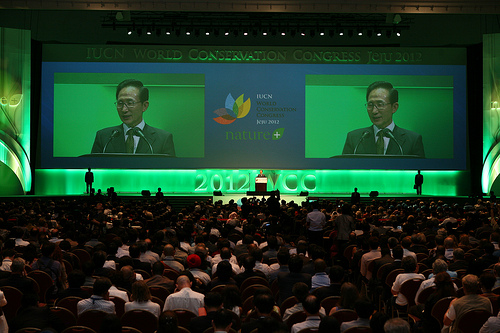
Global conservation organization adopts solar cooking resolution sponsored by Solar Household Energy

The International Union for the Conservation of Nature (IUCN) has embraced a strong resolution sponsored by Solar Household Energy calling for increased support for solar cooking efforts worldwide. The measure was adopted in September at IUCN’s quadrennial World Conservation Congress in Jeju, South Korea.
IUCN, founded in 1948, is the world’s first global environmental organization with over 1,200 member organizations, including 200 governments, as well as some 11,000 volunteer scientists and experts operating from 160 countries. Members must be nominated by current members, and satisfy strict selection criteria before joining the organization.
SHE is a member of the respected organization, and was represented at the Congress by SHE Board members Dorothy Zbicz and Scott Hajost, who previously served as Director of IUCN’s Washington, DC office. IUCN’s backing of the resolution adds significant authority to organizations and individuals that have been working towards the acceptance of solar cooking as an essential and viable environmentally beneficial technology.
In adopting the resolution, the IUCN accepted several essential premises for supporting solar cooking incorporated in the resolution, including:
- “Significant negative consequences” of cooking over biomass fires are sustained in the areas of human health, ecosystem degradation and climate change,
- Policy, supply-side and demand-side constraints are hindering the widespread adoption of solar cooking,
- Solar cooking can help communities adapt to changing climates that may reduce the availability of wood and other traditional biomass cooking fuels, and
- An array of technologies exist and are being further developed to address these issues.
Among other actions, the resolution calls on its members and other entities to:
- Explore the appropriate applications of solar cooking in their countries, including expanding research into improving the technology and its adoption and adding solar cooking to their own renewable energy policies,
- Promote within other organizations that members belong to “the inclusion of solar thermal energy as part of a complete and sustainable solution for clean cooking where it can contribute to healthy, resilient ecosystems and communities,” and
- Ensure that technology standards being developed by the Global Alliance on Clean Cookstoves include criteria for solar cookstoves as well as biomass-burning stoves.
The resolution was co-sponsored by five other IUCN members: Grupo Jaragua (an environmental organization based in the Dominican Republic which maintains a strategic partnership with SHE), The Natural Resources Defense Council, the Center for Environmental Legal Studies, Earth Day Network and the InterEnvironment Institute.



